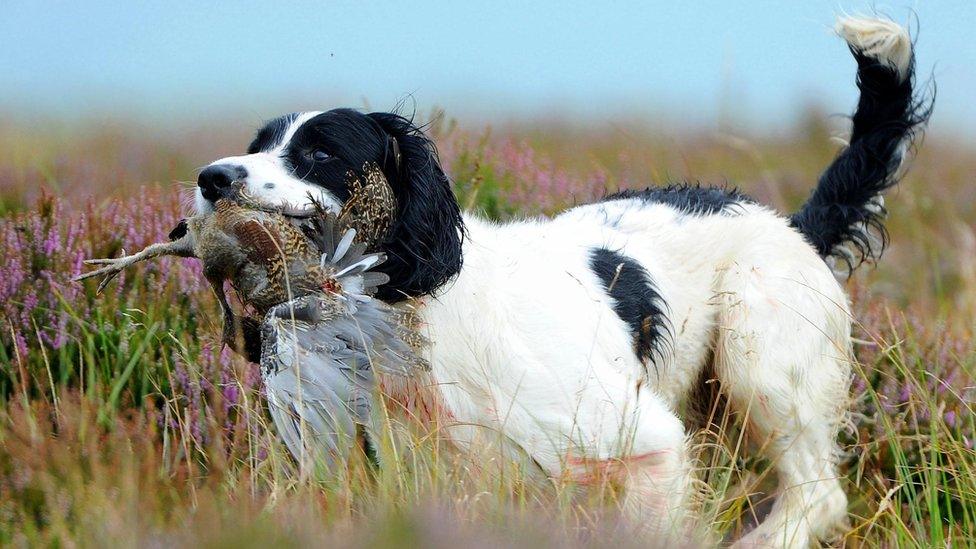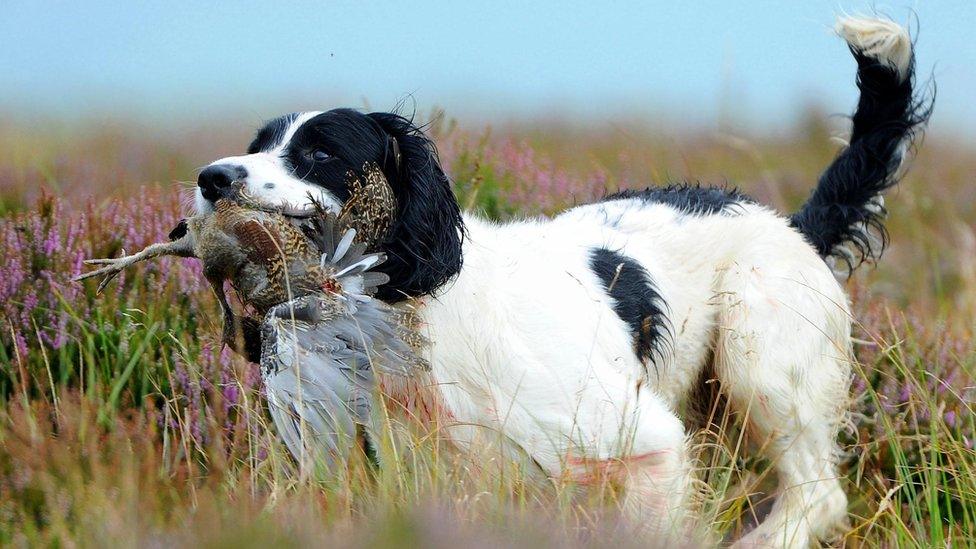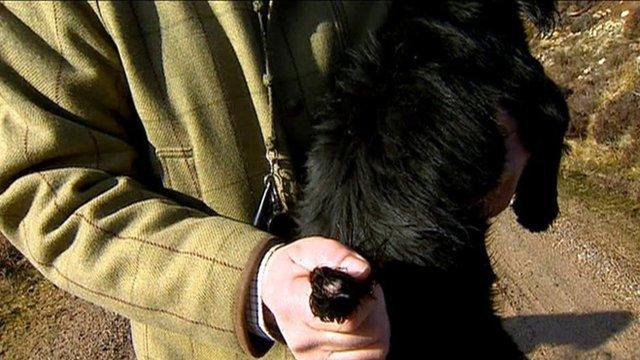Scots ban on puppy tail docking relaxed after Holyrood vote
- Published

Ministers say working dogs are at an increased risk of injury if they do not have their tails docked
An outright ban on tail docking for dogs has been scrapped after MSPs voted to allow exemptions for specific breeds.
The changes mean vets will be allowed to shorten the tails of some working dogs, which ministers say are at increased risk of injury.
Opposition members launched a last-ditch attempt to maintain the blanket ban, ahead of the final Holyrood vote.
However the government ultimately won out with Conservative backing.
Members voted by 86 to 29 to pass an amendment to existing laws, with nine members abstaining.
The vote was not along unanimous party lines, with SNP backbencher Christine Grahame urging members of her own party to vote down the change.
Nine SNP members ultimately abstained, while the Lib Dems were also split, with four MSPs backing the move and one - Alex Cole-Hamilton - opposing it.
Specific exemptions
The Scottish government brought in the outright ban - the only one of its kind in the UK - in 2007 as part of the Animal Health and Welfare (Scotland) Act.
The amendment to the law brings in exemptions for two specific breeds of working dog - spaniels and hunt point retrievers - and only applies to the final third of the tail.
The move was earlier backed by the environment committee, although that vote was also a split decision.
Scottish Government Veterinary Adviser Andrew Voas told the committee he estimated about 80 puppies would have their tails docked a year to avoid having to carry out one amputation on an older dog due to injury, which would cause more pain than the earlier procedure.

MSPs voted by 86 to 29 to end the blanket ban
Extra time was provided for debate of the matter in the chamber, rather than the usual procedure of moving straight to the vote on secondary legislation.
Labour MSP David Stewart said ending the blanket ban would be "a retrograde step for animal welfare" which was not backed by any animal welfare or veterinary group.
Green member Mark Ruskell added that ending the ban was an "ill-conceived, illogical, anti-scientific reversal of what was a progressive policy to protect dogs".
And deputy presiding officer Christine Grahame urged fellow SNP backbenchers to vote "with impartial and informed opinions" and "reject exemptions to tail docking".
However Conservative member Finlay Carson said his party would back the change for "a very limited number of working dogs", while recognising that it was an emotive issue.
And Environment Minister Roseanna Cunningham closed by telling members that the exemption would only apply to spaniels and hunt point retrievers. She said vets would make decisions in the best interests of animals.
She said the move was "proportional", conceding that tail shortening was "briefly painful" but saying this was nothing compared to the injuries suffered by some working dogs later in life.
'Deeply saddened'
Animal welfare groups including the Dogs Trust and OneKind voiced disappointment at the move.
Dogs Trust Deputy Veterinary Director Run Hanaghan, who gave evidence at Holyrood opposing the move, said: "Tail docking involves severing through bone, nerve, muscle, and connective tissue when pups are less than 5 days old, at which point it is very difficult to guarantee they will go on to be working dogs.
"We are deeply saddened that the Scottish Government is reintroducing this outdated and unnecessary practice. Sadly today we've seen a significant step backwards for animal welfare from a country who once led the way."
However, the Scottish Gamekeepers Association welcomed the move, saying it was "recompense for all working spaniels and hunt point retrievers who have had to endure ten years of painful injuries".
Chairman Alex Hogg said: "The ban on tail docking in 2007 was made with good intentions but failed to account for working dogs, whose jobs are very specific. The welfare of these animals was compromised by the legislation and Scottish government deserve immense credit for taking a progressive, evidence-based step to rectify that today.
"Some have conflated tail shortening with full tail docking, which leaves dogs with only a stump. This is the opposite. It is a quick, preventative procedure protecting the animal over its whole working life, leaving it with an expressive, waggy tail."
- Published13 June 2017

- Published10 December 2015
